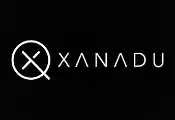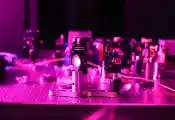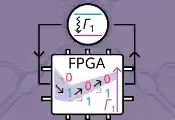Diraq Advances to Next Phase of DARPA’s Utility-Scale Quantum Computing Initiative
SYDNEY, Australia and PALO ALTO, Calif., November 06, 2025 -- The race to build a practical quantum computer has taken another decisive step forward. Diraq today announced it has been selected by the U.S. Defense Advanced Research Projects Agency (DARPA) to advance to Stage B of the Agency’s Quantum Benchmarking Initiative (QBI) – a program to determine if any quantum computing approach can achieve utility-scale operation by 2033.
After successfully completing Stage A, awarded in April, Diraq will continue into Stage B to advance its work in developing a utility-scale quantum computer (USQC) – a quantum system that delivers more economic value than it costs to build and operate – demonstrating that quantum computing is not only possible, but economically viable for solving real-world problems.
Diraq’s design for a USQC encodes quantum information in electrons isolated in silicon. These quantum bits (qubits) can be confined and controlled using modified silicon transistors, the basic building blocks of conventional computers – making Diraq’s design the most scalable and cost-effective method, capable of integrating millions of qubits on a single chip.
During Stage A, Diraq worked closely alongside DARPA’s team of scientific experts to validate the feasibility of the company’s design to build a USQC by DARPA’s target date of 2033. Of the 17 teams selected to participate in Stage A, only those who have passed the stringent review process – including Diraq – have progressed to Stage B. Over the next 12 months, Stage B participants will focus on refining and expanding their designs and developing detailed research and development roadmaps to drive the transition from concept to scalable, real-world USQCs.
“Quantum computing becomes transformative when it addresses real-world challenges and generates genuine commercial returns,” said Andrew Dzurak, Diraq’s CEO and Founder. “DARPA’s QBI program, which focuses on achieving utility-scale quantum computing, is aligned with Diraq’s vision: deploying systems that are not only technically feasible and scalable, but which also deliver far greater value than they cost to build and operate – ensuring that quantum computing provides meaningful real-world value to customers without prohibitive costs.”
To accelerate its progress toward utility scale, Diraq leads a global consortium of industry and academic partners across Australia, the United Kingdom and the United States. Building on the success of Stage A, Diraq’s consortium partners advancing to Stage B include Riverlane, Emergence Quantum, Iceberg Quantum, and the Centre for Quantum Software and Information at the University of Technology Sydney. In Stage B, Quantum Machines and the University of Wisconsin-Madison will join the consortium, further broadening the expertise and footprint across key quantum technology and research hubs.
Working with Dell Technologies, Diraq continues to make progress towards building utility scale quantum computers. Together, they aim to provide domain knowledge on accelerated compute infrastructure and hybrid quantum classical computing. Diraq also has continuing partnerships with US chip manufacturing powerhouse Global Foundries and imec in Europe. Both have significant capabilities in advanced semiconductor manufacturing and packaging, and have already supported Diraq in its QBI Stage A performance.
“Quantum computers won’t exist in isolation – they need to plug into today’s computer infrastructure,” said John Roese, Global CTO and Chief AI Officer, of Dell Technologies. “Our collaboration with Diraq is about building that bridge, ensuring the classical systems underpinning global computing can scale seamlessly into the quantum era.”
Founded in Sydney, Australia with U.S. operations across Palo Alto, Boston and Chicago, Diraq has in recent months delivered two landmark technical achievements – both published in Nature. In June, Diraq reported the successful integration of cryogenic electronics with its qubits, and in September showed that silicon spin qubits fabricated in a foundry environment consistently exceed 99% fidelity (accuracy) in all quantum operations, a key threshold for quantum error correction.




































